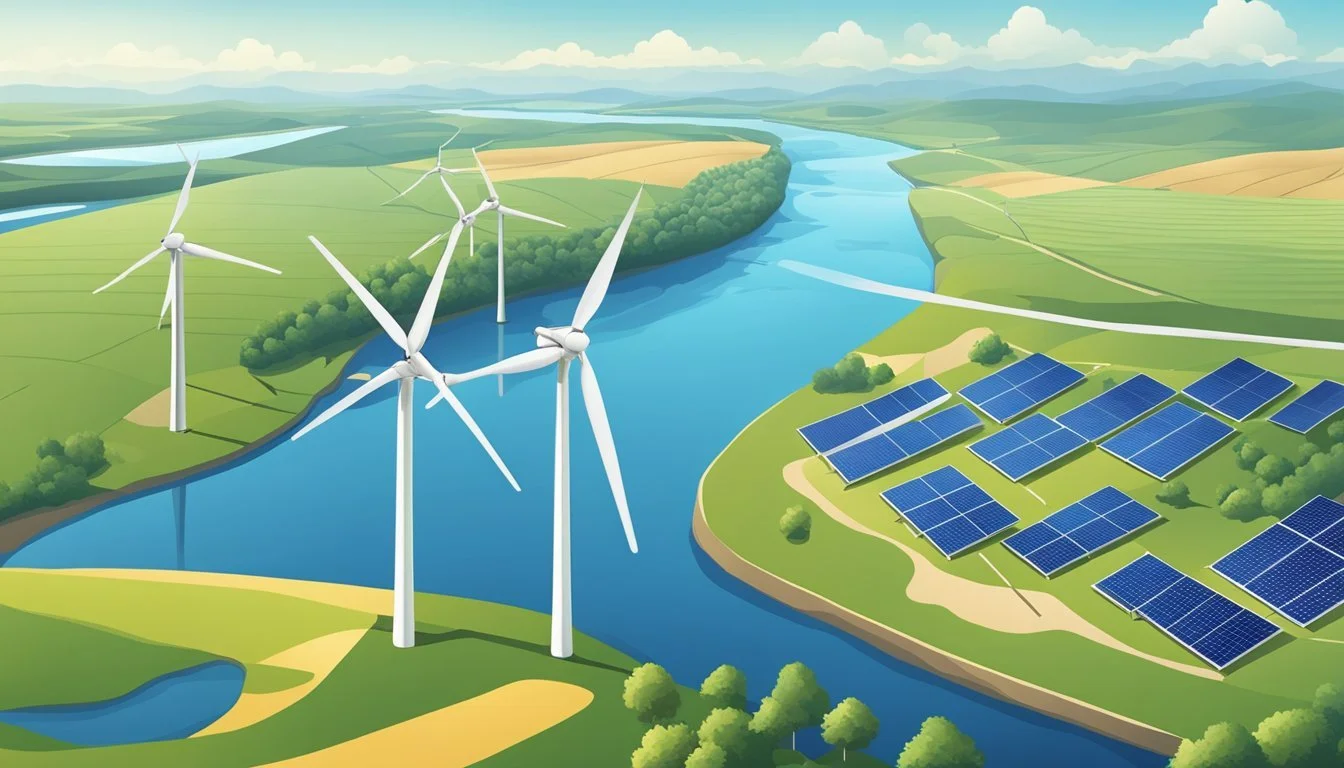Climate Chaos on JRE: Rogan's Podcast Ignites Global Warming War!
Joe Rogan's podcast has become a platform for discussions on climate change, attracting both experts and skeptics. The popular show reaches millions of listeners, making it an influential space for shaping public opinion on environmental issues.
While Rogan has hosted climate scientists and environmental experts, he has also given airtime to guests who challenge the scientific consensus on climate change. This mix of perspectives has led to criticism from some who argue that the podcast may spread misinformation about the climate crisis.
The debate surrounding Rogan's coverage of climate change highlights the broader challenges of communicating complex scientific issues to a general audience. It raises questions about the responsibility of media platforms in presenting accurate information on critical global challenges like climate change.
Joe Rogan and the Climate Change Dialogue
Joe Rogan's podcast has become a prominent platform for discussions on climate change, sparking both controversy and debate. The show's reach and Rogan's approach to interviewing guests have significant implications for public understanding of climate issues.
Influence of The Joe Rogan Experience
The Joe Rogan Experience, hosted on Spotify, reaches millions of listeners worldwide. Rogan has featured various guests discussing climate change, including scientists, authors, and public figures. These conversations often present diverse viewpoints on climate science and policy.
Some episodes have drawn criticism for platforming guests who challenge established climate science. Dr. Steven Koonin's appearance, where he discussed his book "Unsettled," sparked debate about the climate change consensus.
Rogan's interviewing style, which allows guests to speak at length, has been both praised for its depth and criticized for potentially spreading misinformation.
Public Perception and Responsibility
The podcast's influence on public perception of climate change is significant. Rogan's audience, largely comprising younger demographics, may form opinions based on these discussions.
Critics argue that Rogan has a responsibility to fact-check claims made by guests, particularly on complex scientific topics. Supporters contend that the show provides a forum for open dialogue.
Climate researchers express concern about the spread of conspiracy theories through popular media platforms. They emphasize the importance of accurate scientific communication to combat misinformation.
Spotify, as the podcast's host, faces scrutiny over its content moderation policies regarding climate-related discussions. The platform must balance free speech concerns with the potential impact of climate misinformation.
Climate Change: The Core Issues
Global warming and greenhouse gas emissions are central to understanding climate change. These interconnected phenomena are reshaping Earth's climate systems in profound ways.
Understanding Global Warming
Global warming refers to the long-term increase in Earth's average surface temperature. This rise is primarily driven by human activities that release heat-trapping gases into the atmosphere. Since the pre-industrial era, global temperatures have risen by about 1°C.
Key factors contributing to global warming include:
Burning of fossil fuels
Deforestation
Industrial processes
Agricultural practices
The impacts of global warming are far-reaching. They include:
Rising sea levels
More frequent extreme weather events
Shifts in plant and animal ranges
Changes in precipitation patterns
Scientists use various methods to track global temperature changes, including satellite data, weather station records, and ocean temperature measurements.
Greenhouse Gas Emissions and Their Impact
Greenhouse gases (GHGs) play a crucial role in Earth's climate system. They trap heat in the atmosphere, causing the greenhouse effect. While this effect is natural and necessary for life on Earth, human activities have significantly increased GHG concentrations.
The main greenhouse gases include:
Carbon dioxide (CO2)
Methane (CH4)
Nitrous oxide (N2O)
Water vapor
Fluorinated gases
CO2 is the most significant human-produced greenhouse gas. Its atmospheric concentration has risen from about 280 parts per million (ppm) in pre-industrial times to over 410 ppm today.
GHG emissions come from various sources:
Sector Percentage of Global Emissions Energy 73.2% Agriculture 18.4% Industrial processes 5.2% Waste 3.2%
Reducing GHG emissions is crucial for mitigating climate change. This requires a shift towards renewable energy sources, improved energy efficiency, and changes in land use practices.
The Role of Media and Podcasts in Climate Discourse
Media outlets and podcasts significantly shape public understanding of climate change. They serve as key platforms for disseminating information and influencing opinions on this critical issue.
Dissecting Climate Misinformation
Podcasts like The Joe Rogan Experience have become influential in climate discussions. With millions of listeners, these shows can spread inaccurate information rapidly.
Scientists express concern over episodes featuring guests who challenge established climate science. These segments often present misleading arguments that contradict scientific consensus.
Media fact-checking plays a crucial role in combating climate misinformation. Experts work to debunk false claims and provide accurate data to the public.
Spreading Awareness Through Digital Platforms
Digital media offers opportunities to educate large audiences about climate change. Podcasts and online shows reach millions, making complex scientific concepts accessible.
Climate scientists increasingly engage with these platforms to share research findings. They aim to counter misinformation and promote evidence-based understanding.
Social media amplifies climate discussions, allowing for rapid information sharing. This can help raise awareness but also risks spreading unverified claims.
Media outlets face the challenge of balancing diverse viewpoints while maintaining scientific accuracy in climate reporting. Responsible journalism is key to informing public opinion on this critical issue.
Scientific Consensus on Climate Change
The scientific community overwhelmingly agrees that human activities are causing global climate change. Leading scientific organizations and thousands of climate experts have examined the evidence and reached this conclusion.
The Voice of Climate Scientists
97% of actively publishing climate scientists agree that human activities are causing global warming. This consensus is based on multiple studies analyzing thousands of peer-reviewed papers on climate change. Climate scientists have observed rising global temperatures, sea levels, and greenhouse gas concentrations.
They've also documented melting glaciers, shifting precipitation patterns, and more extreme weather events. These observations align with climate model projections. The Intergovernmental Panel on Climate Change, composed of hundreds of leading climate experts, has stated that human influence on the climate system is clear.
NASA's Stance on Climate Crisis
NASA affirms that climate change is occurring now, caused primarily by human activities. The agency's Earth science division studies climate change using satellite observations, ground-based measurements, and climate models. NASA data shows global temperature rise, warming oceans, shrinking ice sheets, and sea level rise.
The agency states these changes are proceeding at unprecedented rates. NASA emphasizes that most climate scientists agree the main cause is human expansion of the "greenhouse effect." This occurs when the atmosphere traps heat radiating from Earth toward space. NASA continues to monitor and research climate change impacts.
Energy Transition and Climate Solutions
The shift to renewable energy and adoption of electric vehicles represent critical steps in addressing climate change. These advancements aim to reduce reliance on fossil fuels and cut greenhouse gas emissions.
Shift to Renewable Energy
Renewable energy sources like solar, wind, and hydropower are rapidly expanding worldwide. Costs for solar panels and wind turbines have fallen dramatically, making renewables increasingly competitive with fossil fuels. Many countries are setting ambitious clean energy targets.
The U.S. aims to generate 100% carbon-free electricity by 2035. China leads global solar panel production and is building massive wind and solar farms. Europe is investing heavily in offshore wind.
Challenges remain in energy storage and grid integration. Advances in battery technology and smart grids are helping overcome intermittency issues with wind and solar power.
Electric Vehicles and Their Role
Electric vehicles (EVs) are a key technology for decarbonizing transportation. Major automakers are introducing new EV models and investing billions in production.
Tesla, led by Elon Musk, has pushed the industry toward electrification. Legacy automakers like GM and Ford are now following suit with ambitious EV plans.
EV adoption is accelerating globally. Norway leads with over 80% of new car sales being electric. China is the world's largest EV market.
Charging infrastructure is expanding rapidly. Battery technology continues improving, extending vehicle range and lowering costs.
Critics argue the environmental benefits depend on how electricity is generated. As grids shift to renewables, EV emissions will decrease further.
Influence of Public Figures on Climate Narrative
High-profile individuals shape public perception and discourse on climate change through their platforms and statements. Their views can sway millions of followers, impacting policy discussions and public understanding of environmental issues.
Elon Musk's Contributions
Elon Musk, CEO of Tesla and SpaceX, wields significant influence in the climate change debate. His electric vehicle company promotes sustainable transportation, contributing to reduced carbon emissions. Musk's tweets and public statements on climate issues reach millions of followers.
He advocates for carbon pricing and renewable energy adoption. Musk's Gigafactory initiatives aim to scale up battery production for electric vehicles and energy storage systems. These efforts align with climate mitigation strategies.
However, Musk's statements sometimes contradict scientific consensus. His appearances on popular podcasts like The Joe Rogan Experience have sparked debates about climate science accuracy in public forums.
Impact of Statements by Jordan Peterson
Jordan Peterson, a clinical psychologist and author, has voiced skepticism about climate change models and policies. His large online following amplifies these views across social media platforms.
Peterson questions the reliability of climate projections and the economic impacts of proposed environmental regulations. He argues that climate activists exaggerate threats and that adaptation strategies may be more effective than mitigation efforts.
His statements often challenge mainstream climate science narratives. This has led to heated debates with climate experts and activists. Peterson's influence extends beyond academia, shaping public opinion on climate policy among his supporters.
Confronting Conspiracy Theories in Climate Discourse
Climate change discussions often face a significant hurdle: the spread of conspiracy theories and misinformation. These false narratives can impede progress on climate solutions and confuse public understanding.
Many communities working to address climate change encounter resistance fueled by unfounded claims. These range from doubts about scientific consensus to elaborate conspiracies about climate action motives.
Prominent media figures sometimes amplify climate misinformation. Joe Rogan's podcast, with its massive audience, has featured guests promoting climate skepticism and alternative theories lacking scientific basis.
Climate disinformation on social media platforms like TikTok can quickly go viral, reaching millions. This rapid spread makes it challenging for accurate information to compete.
Effective confrontation of climate conspiracy theories requires:
Clear, accessible explanations of climate science
Debunking of common myths with factual evidence
Promotion of credible sources and expert voices
Media literacy education to help people identify misinformation
Scientists, policymakers, and communicators must work together to ensure accurate climate information reaches the public. This collaborative effort is crucial for fostering informed discussions and actions on climate change.
Fossil Fuel Industry and Climate Policy
The fossil fuel industry has played a significant role in shaping climate policy in the United States. For decades, oil and gas companies have funded disinformation campaigns to cast doubt on climate science.
These efforts have effectively delayed meaningful action on climate change. Industry-sponsored messaging has promoted the idea that climate research is too uncertain to justify reductions in fossil fuel use.
Headlines like "Climate Change: a degree of uncertainty" and "Uncertain Science" have reinforced this narrative. Such messaging aims to portray climate science as unreliable or inconclusive.
The industry's tactics have evolved over time. Early campaigns focused on denying the reality of climate change entirely. More recent efforts have shifted to downplaying the urgency of the issue.
Some fossil fuel companies have invested in green energy projects. However, these investments often represent a small fraction of their overall business activities.
Climate scientists face challenges in countering industry narratives. Appearances on popular platforms like Joe Rogan's podcast aim to reach wider audiences with factual information.
Despite industry pushback, renewable energy costs have plummeted in recent years. This trend is making green energy increasingly competitive with fossil fuels in many markets.




